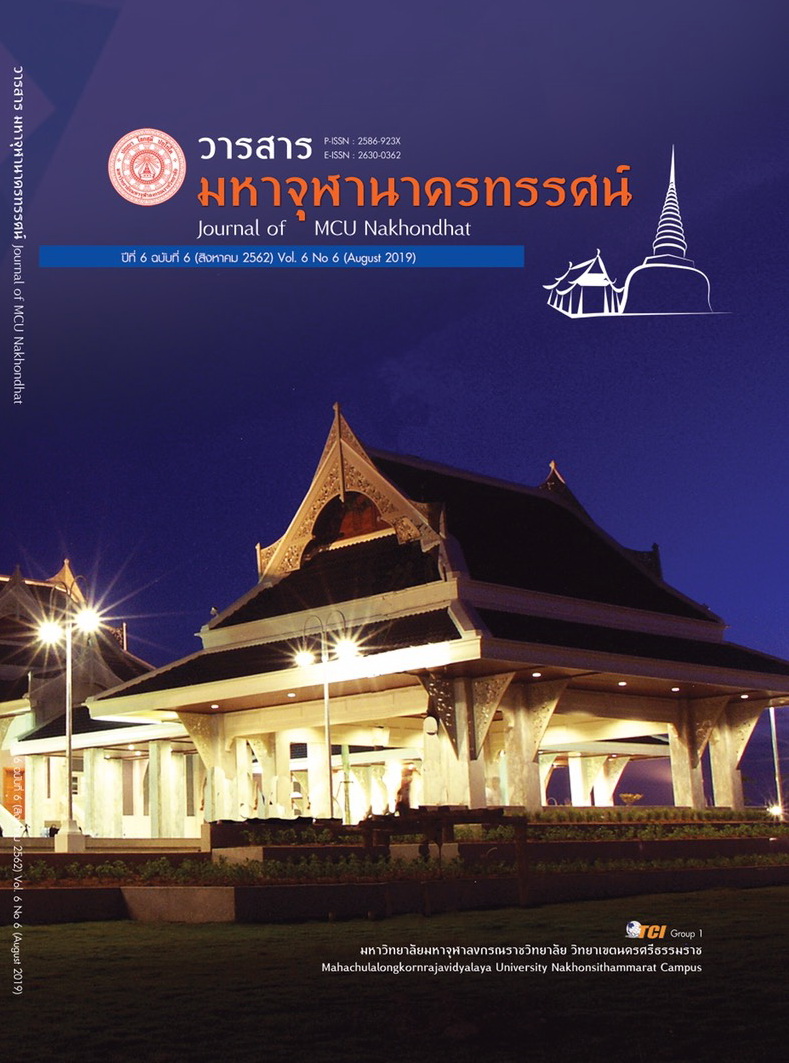DHAMMA PRINCIPLES AND OFFENDERS
Main Article Content
Abstract
This study aimed to investigate the applying of appropriate dharma principles for offenders. The action research was done to gather dhamma principles, forms and procedure which appropriated for offenders and to rehabilitate the offenders to be a good citizen without committing the crime again.
According to the study, it was found that the initially important principle of dhamma that was employed to the offenders was “consciousness”. To create consciousness and concentration in oneself brought about thinking procedure of the brain, noticing the truth of dhamma principles, being sensible, being aware of life according to “apperception and wisdom”. Moreover, the offenders could know and pay attention to oneself with the right way and could create the protection to oneself in order not to commit the crime again. The ways to improve those offenders was to let the offenders learn through different forms. The result showed that “dhamma principles which appropriated for the offenders” were 1)the relations of greed, anger and delusion in oneself, 2)shame of sins, 3)five groups of personality, 4)consciousness, 5)Samudaya (the truth of the origin of suffering), 6)senses, 7) restraint of senses, 8)dishonesty, 9)the 5 faculties, 10)charity, virtue and spiritual cultivation, 11)heart, 12)suffering, 13)sensuality, 14)the 1,500 defilements and the 108 passions and 15) sixteen causes of sorrow.
Article Details
References
ธานี วรภัทร์. (2561). หลักธรรมสำหรับผู้กระทำผิด. ใน ทุนสำนักพระดำริในพระเจ้าหลานเธอ พระองค์เจ้าพัชรกิติยาภา. กระทรวงยุติธรรม.
พระพุทธโฆสเถระ. (2546). คัมภีร์วิสุทธิมรรค. แปลโดย สมเด็จพระพุฒาจารย์ (อาจ อาสภมหาเถร) (พิมพ์ครั้งที่ 4). กรุงเทพมหานคร: บริษัท ประยูรวงศพริ้นท์ติ้ง จำกัด.
พระศากยวงศ์วิสุทธิ์. (2561). จิตตมนต์ ปัญญาบำบัด. สำนักกิจการในพระดำริพระเจ้าหลานเธอ พระองค์เจ้าพัชรกิติยาภา สำนักงานปลัดกระทรวงยุติธรรม กระทรวงยุติธรรม.
สมเด็จพระญาณสังวร สมเด็จพระสังฆราช สกลมหาสังฆปริณายก. (2556). จิตตนคร. กรุงเทพมหานคร: สาละพิมพ์.
สมเด็จพระพุทธโฆษาจารย์ (ป. อ. ปยุตฺโต). (2560). บทนำสู่พุทธธรรม ชีวิตงาม สังคมดี ธรรมชาติเป็นรมณีย์ (พิมพ์ครั้งที่ 5). กรุงเทพมหานคร: ส.ไพบูลย์การพิมพ์.
สมเด็จพระพุทธโฆษาจารย์ (ป. อ. ปยุตฺโต). (2560). นิติศาสตร์แนวพุทธ (พิมพ์ครั้งที่ 20). กรุงเทพมหานคร: วิญญูชน.
สมเด็จพระพุทธโฆษาจารย์ (ป. อ. ปยุตฺโต). (2560). บทนำสู่พุทธธรรม (พิมพ์ครั้งที่ 3). กรุงเทพมหานคร: ส.ไพบูลย์การพิมพ์.
สมเด็จพระพุทธโฆษาจารย์ (ป. อ. ปยุตฺโต). (2560). พุทธธรรมฉบับปรับขยาย (พิมพ์ครั้งที่ 48). กรุงเทพมหานคร: ผลิธัมม์.
Bringewat Peter. (2008). Grundbegriffe des Strafrecht. Auflage: Baden-Baden.


